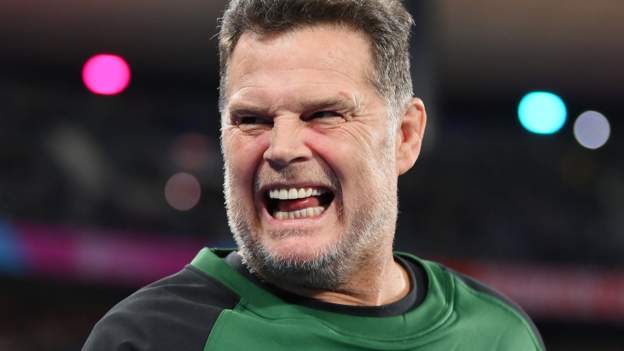
| Venue: Stade de France, Paris Dates: Saturday, 28 October Kick-off: 20:00 BST |
| Coverage: Commentary on BBC Radio 5 Live, plus text updates on the BBC Sport website and app. |
They called it, simply, ‘the Move’.
Rassie Erasmus, high in the Yokohama Stadium stands, hand over his mouth, bellowed those two words into his headset microphone.
In front of him, the 2019 Rugby World Cup final was 55 minutes old and far from over. An Owen Farrell penalty for England had just cut South Africa’s lead to a skinny six points.
Amid the maelstrom, the Springboks heard their head coach’s message.
Malcolm Marx’s flat, fast line-out throw was pitched straight into the paws of a grounded Eben Etzebeth, catching England on the hop.
Damian de Allende crashed the ball up in midfield. And, when Faf de Klerk switched play back blind, the whole forward pack were waiting, at walking pace, within touching distance of each other.
They didn’t attempt to win the collision – the constant mantra of modern rugby – instead taking contact, binding together and setting up an immediate eight-man maul.
It was a ram raid on an unprepared England defence. Dan Cole was pinged for attempting to take out South African legs. Handre Pollard slotted the subsequent penalty. Erasmus grinned broadly in the coaching box.
In many ways, the move summed up the man: it was innovative, impulsive and successful, with a dash of paranoia thrown in.
Because, in the days leading up to the final, Erasmus had been too nervous to drill the move on the training pitch.
- The All Blacks’ ‘Easy Company’ taking on the ‘Bomb Squad’
- Rugby World Cup 2023 final: New Zealand & South Africa’s rivalry and history
- England focus on finishing World Cup in ‘right way’
South Africa’s World Cup final base, like most of Yokohama, was overlooked by a clutch of skyscrapers. Erasmus feared the Move might be captured, analysed and neutralised from a hidden vantage point.
So, before the final, the Springboks never practised it in anger or in studs. Instead, the players ran through their required on-pitch movements on a big screen, using an individual controller to move a graphical representation of themselves in concert with their team-mates.
The software – called Outfox and created by Erasmus – is designed to sear a playbook into the minds of players more quickly and effectively.
Once the high-tech whiteboard work was done they walked through their new move in a hotel conference room, with bottles of beer, rather than isotonic, at hand. The next time they would attempt it – and the first time on a pitch – would be in the biggest match of their lives.
Such fabled stories inspire supporters and spawn songs.
At France 2023, South Africa fans have taken to serenading their now-director of rugby with their own take on the Cranberries’ Zombie, a song that had been Ireland’s unofficial anthem at the tournament.
Rassie, they inform their rivals, is in your head.
The 50-year-old, whose ploys have also included using coloured lights to communicate with the touchline, appointing himself as a water carrier to get access to his players in play, and publicly reviewing refereeing performances, is certainly often in the headlines.
When writer David O’Sullivan drove up to a vineyard restaurant in the hills above Cape Town in January to meet Erasmus for the first time, he had his own preconceptions.
“I had the impression of a very extroverted, flamboyant, charismatic person who was always having fun,” O’Sullivan told BBC Sport.
“What I found wasn’t any of those.”
O’Sullivan, tasked with ghosting writing Erasmus’ autobiography Rassie, was, like many of his subject’s opponents, wrong-footed.
“Actually he was an incredibly shy bloke, who shunned any kind of social engagement,” he said.
“He was quite insular – I found him to even be quite awkward at times.”
Considering Erasmus’ high profile in social and traditional media, O’Sullivan understands the scepticism that might greet his description.
But he points to Erasmus’ ‘tells’ – the bouncing knee, the fiddling hands, the fixed smile – when he is in front of the microphones.
“He is out of his comfort zone speaking with people he doesn’t know,” he says. “He finds it difficult, but he masks it because he wants to give head coach Jacques Nienaber the protection from media attention that he never had in that role.
“He also has almost no filters, so he will speak his mind without fully appreciating the consequences of what he has done.”
Jaco Taute saw similar from a different angle. Taute first met Erasmus in 2012 when he was a Springbok and Erasmus was SA Rugby’s high-performance manager. “This guy is on another level,” he remembers thinking.
Their paths crossed again in 2016 in the south of Ireland. Erasmus was appointed director of rugby at Munster and brought in Taute, initially on a short-term to cover an injury.
A month later, Munster’s head coach Anthony Foley died suddenly, aged just 42. Everything changed.
Still only recently arrived in Cork, Erasmus became head coach, charged with steering an emotional squad through the rest of the season.
“It was extremely tough for everyone, but the way Rassie handled the situation galvanises us,” Taute told BBC Sport.
“Almost out of respect to Axel [Foley’s nickname] he brought the team together to show how powerful and how important Axel was to Munster and their history
“He made the rest of the season a tribute to Axel. It must have been very tough for him, but the way he handled it was incredible.
“Rassie sometimes comes across as this calculated scientist of rugby – all game plans and bench splits – but he is brilliant at the emotional stuff as well.”
The same blunt straight talking that sparks headlines was deployed in Eras
…. to be continued
Read full article at the Original Source
Copyright for syndicated content belongs to the linked Source : BBC News – https://www.bbc.co.uk/sport/rugby-union/67207277?at_medium=RSS&at_campaign=KARANGA

